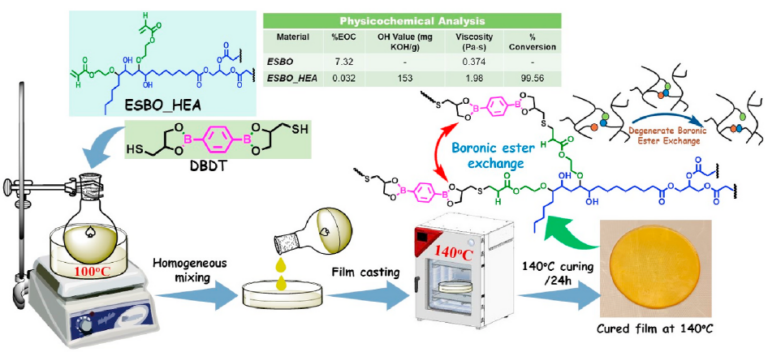621. Sustainable soybean oil acrylate for boronic ester vitrimer: Self-healing, reprocessable and extensive elongation performance
Chandan Bodhak, Pranabesh Sahu, Ram K. Gupta, Polymer, (2025), DOI: 10.1016/j.polymer.2025.128095
Vitrimers have currently emerged as an ideal alternative to conventional thermosetting resins combining the benefits of both thermoplastic and thermoset. But, maintaining the superior performance of vitrimers with good mechanical and stimuli-responsive properties still presents significant challenges. Epoxidized plant oil-derived thermosets are typically constrained by their non-processability and poor mechanical qualities. Henceforth, the development of smart, recyclable, and eco-friendly benevolent thermosets by integrating dynamic covalent bonds into cross-linked polymer networks can resolve the trade-off to overcome these drawbacks. In this work, we demonstrate a one-pot thermally-controlled “thiol-acrylate” coupling between a novel soybean oil acrylate (ESBO_HEA) and dynamic diboronic ester dithiol (DBDT) cross-linker to prepare a self-healable biobased vitrimer employing the green chemistry protocols. The synthesized ESBO_HEA-DBDT vitrimers with covalently crosslinked networks can alter the topologies through the exchange of reversible bonds of boronic ester, which allows room temperature self-healing phenomenon. Thermomechanical characteristics and vitrimeric features have been studied by dynamic mechanical analysis, showing that stress relaxes very quickly at low temperatures, leveraging the dioxaborolane exchange metathesis. The absolute value of glass transition temperature (Tg) determined from DMA analysis was 5.22 ◦C, above which the vitrimer exhibits dynamic nature by associative boronic ester exchange. Moreover, the developed vitrimer demonstrates extensive elongation (700–1200 %) properties and excellent reprocessability. Even after 2 cycles of reprocessing, the mechanical characteristics of the reprocessed vitrimers were retained as compared to the original materials. The self-healing efficiency of the biobased vitrimers reached 100 % at room temperature in less than 15 h, whereas the sample achieved complete healing within 4 h when thermally triggered at 50 ◦C. Through dynamic-mechanical analyses, ESBO_HEA vitrimer reveals remarkably short relaxation time of 15.6 s at 25 ◦C and an activation energy of 8.70 kJ/mol. In addition, it can be easily recycled by reversibly hydrolyzing in 95 % ethanol and then evaporating the solvent to regenerate the original vitrimer. Briefly, the present research illustrates the potent malleability, reprocessability, self-healing, and extensive elongation properties of the covalently cross-linked vitrimers derived exclusively from renewable resources.
